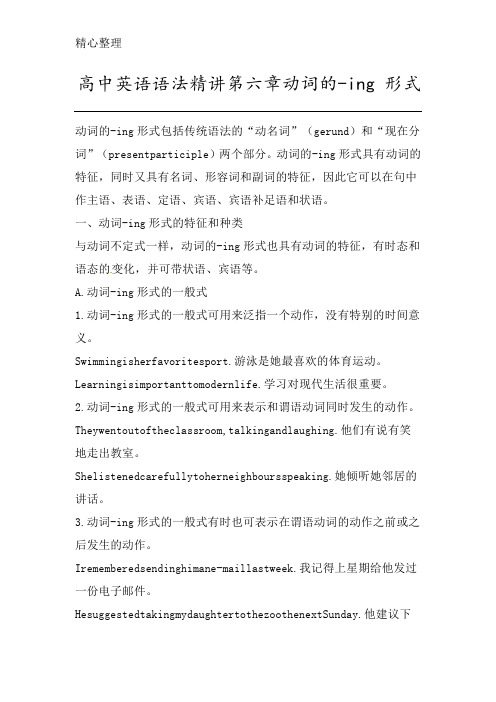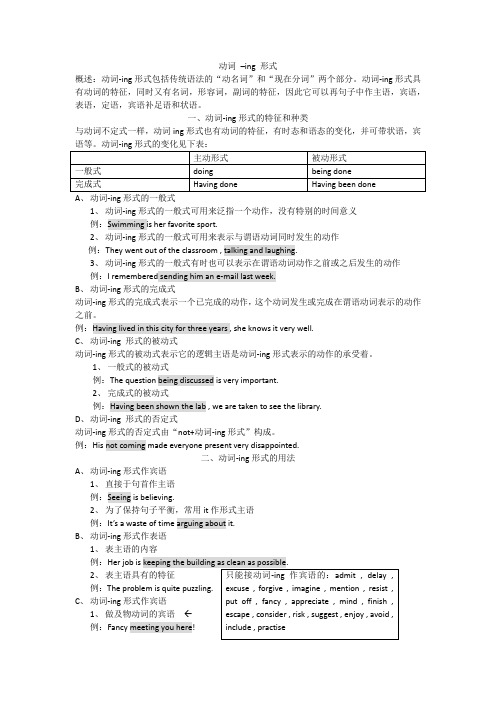英语语法-动词的ing形式
高中英语动词ing形式作主语语法精讲+练习(附答案)

动词ing形式作主语语法精讲+练习(附答案)V-ing形式1.动词-ing形式作主语(doing/being done作主语不表示正在进行,只表示主/被动)(1)动名词短语作主语时,可以直接放在句首。
谓语动词常常用单数,但表示多于一个的概念时,谓语动词则用复数。
Playing cellphone games is his favourite.玩手机游戏是他的最爱。
Dancing and skating are my hobbies,and I also like to read short stories.跳舞和溜冰是我的爱好,同时我也喜欢读短篇小说。
Being laughed at in public made me embarrassed.当众被人嘲笑让我感到尴尬。
(2)有时用it作形式主语,常用于It is/was a waste (of...)/no use/no good doing sth.结构中。
It is no use trying to persuade such a stubborn person.想要说服这样一个固执的人是没有什么用处的。
2.动词-ing形式作宾语(doing/being done作宾语不表示正在进行,只表示主/被动)(1)动词-ing 形式可以作介词的宾语I help Mum out by doing the housework that I can do.我通过做力所能及的家务活帮助妈妈。
注意:以下短语中to 都是介词be used to doing习惯于object to 反对devote oneself to 致力于stick to坚持pay attention to注意look forward to期盼adapt to适应adjust to (使)适应于owe...to归咎于be addicted to对……上瘾(2)动词-ing形式可以作某些及物动词的宾语,只跟动名词(doing)作宾语的动词有:mind(介意),miss(错过),mention(提到),enjoy(喜欢),escape(逃避),practise(练习),postpone(推迟),permit(允许),suggest(建议),stand(bear,tolerate)(忍受),consider(考虑),keep(保持),avoid(避免),admit(承认),advise(建议),allow(允许),appreciate(感激),risk(冒险),resist(抵制),recommend(建议),finish(完成),forbid(禁止),imagine(想象),dislike(不喜欢),delay(延迟),quit(放弃),deny(否认)The thief kept running to avoid/escape being caught by the police.小偷不停地跑以避免/逃避被警察抓住。
重点高中英语语法精讲动词的-ing形式

高中英语语法精讲第六章动词的-ing形式动词的-ing形式包括传统语法的“动名词”(gerund)和“现在分词”(presentparticiple)两个部分。
动词的-ing形式具有动词的特征,同时又具有名词、形容词和副词的特征,因此它可以在句中语态的变化,并可带状语、宾语等。
3.动词-ing形式的一般式有时也可表示在谓语动词的动作之前或之后发生的动作。
Irememberedsendinghimane-maillastweek.我记得上星期给他发过一份电子邮件。
HesuggestedtakingmydaughtertothezoothenextSunday.他建议下个星期天带我女儿去动物园。
B.动词-ing形式的完成式动词的-ing形式的完成式表示一个已完成的动作,这个动作发生或完成在谓语动词表示的动作之前。
Havinglivedinthiscityforthreeyears,sheknowsitverywell.在这个城市生活了3年,她对这里已很熟悉。
重要。
Ican'tstandbeingkeptwaiting.我不堪久候。
2.完成式的被动形式Iheardofhishavingbeenchosentobethecoachoftheteam.我听说他被选为球队的教练。
Havingbeenshownthelab,weweretakentoseetheschoollibrary.在被带去看了实验室之后,我们又被带去参观校图书馆。
D.动词-ing形式的否定形式动词的-ing形式的否定形式是由not加动词的-ing形式构成。
Hisnotcomingmadeeveryonepresentverydisappointed.他没来使在场的每个人都很失望。
晚会是这家人的荣耀。
2.为了保持句子平衡,通常用先行词it作形式主语,而把真正的主语放在句末。
Itiseasymakingplans,butitisdifficultcarryingthem.制定计划很容易,实行它却很难。
高考英语复习 专题05 动词的-ing形式 知识点归纳总结

高考英语复习专题05 动词的-ing形式知识点归纳总结动词的-ing形式包括传统语法的“动名词”(gerund)和“现在分词”(present participle)两个部分。
动词的-ing形式具有动词的特征,同时又具有名词、形容词和副词的特征,因此它可以在句中作主语、表语、定语、宾语、宾语补足语和状语。
一、动词-ing形式的特征和种类与动词不定式一样,动词的-ing形式也具有动词的特征,有时态和语态的变化,并可带状语、宾语等。
A.动词-ing形式的一般式1. 动词-ing形式的一般式可用来泛指一个动作,没有特别的时间意义。
Swimming is her favorite sport. 游泳是她最喜欢的体育运动。
Learning is important to modern life. 学习对现代生活很重要。
2. 动词-ing形式的一般式可用来表示和谓语动词同时发生的动作。
They went out of the classroom, talking and laughing. 他们有说有笑地走出教室。
She listened carefully to her neighbours speaking. 她倾听她邻居的讲话。
3. 动词-ing形式的一般式有时也可表示在谓语动词的动作之前或之后发生的动作。
I remembered sending him an e-mail last week. 我记得上星期给他发过一份电子邮件。
He suggested taking my daughter to the zoo the next Sunday. 他建议下个星期天带我女儿去动物园。
B. 动词-ing形式的完成式动词的-ing形式的完成式表示一个已完成的动作,这个动作发生或完成在谓语动词表示的动作之前。
Having lived in this city for three years, she knows it very well. 在这个城市生活了3年,她对这里已很熟悉。
语法复习动词ing形式作主语和宾语课件

详细描述
列出多个句子,其中一些句子含有动词-ing形式作主语或宾语,一些句子则没有,让学 生从中选择正确的句子。
段落写作练习
总结词
提升应用能力
VS
详细描述
布置一个主题或情境,要求学生使用动词 -ing形式作主语和宾语进行段落写作,以 锻炼他们的语言组织和应用能力。
感谢您的观看
THANKS
定义
动词-ing形式作宾语是指动词以ing形式作为句中的宾语成分,常 出现在句子的谓语动词之后。
特点
动词-ing形式作宾语具有进行时 态的特点,表示动作正在进行或 持续发生。
常见句型结构
主语 + 谓语 + 动词ing形式作宾语
主语 + 谓语 + 间接 宾语/直接宾语(动 词-ing形式)
主语 + 系动词 + 表 语(动词-ing形式)
语法复习动词ing形 式作主语和宾语课件
目录
CONTENTS
• 动词-ing形式作主语 • 动词-ing形式作宾语 • 动词-ing形式作主语和宾语的用法 • 动词-ing形式作主语和宾语的注意事项 • 动词-ing形式作主语和宾语的练习与巩
固
01 动词-ing形式作主语
定义与特点
定义
动词-ing形式作主语指的是在英语句子中,使用动词的-ing 形式作为句子的主语,表示该动作或行为是句子所描述的对 象。
特点
动词-ing形式作主语具有描述性、动态性和进行性的特点, 能够生动地描述某个动作或行为的正在进行状态,强调该动 作或行为的持续性、过程性和特征。
常见句型结构
“It + be + -ing + that从句”结构
动词ing

动词-ing形式的构成:是在动词末尾加
-ing 形式构成,因此又叫动词的 -ing 形 式。如: do-doing, be-being, ask-asking, etc. 否定形式:not+ -ing构成。
二、语法特征
动词的-ing形式是英语中非谓语动词的 一种,它在句中可作主语、宾语、表语、定语、状 语及补足语。由于这种形式是由动词变化而来 的,因此它具有动词的一些特征,即可带自己的 宾语和状语,从而构成动词 -ing短语。它有时 态和语态的变化,也有否定形式及其复合结构 形式。 动词-ing形式不能单独作谓语,没有人 称和数的变化。
2)在like , love , hate , prefer等词后,若表 示强调“某种爱好、一般性的倾向”,需用动名 词作宾语;如指某次将要发生的具体行为,则多 用不定式作宾语。 3)在remember, regret后面,接动名词表示 "已发生过的动作";接不定式表示"现在发生或 将要发生的动作" 4)在begin , start , 和cease之后,接动名词 表示“强调有意识地开始或停止某动作”;不定 式则表示“自然、突然地发生的动作”。 5)stop后接动名词表示"要开始动名词表示 的动作",而后接不定式则表示"终止不式表示 的动作" ;try后接动名词表示"试着干某事", 而后接不定式则表示"尽力干某事" 。
忘记要做 忘了曾经做过 很遗憾/抱歉地去做
5)
regret to do
regret doing
try to do 6) try doing mean to do
后悔做了
努力做 试着做 打算做
英语语法 动词-ing形式

动词–ing形式概述:动词-ing形式包括传统语法的“动名词”和“现在分词”两个部分。
动词-ing形式具有动词的特征,同时又有名词,形容词,副词的特征,因此它可以再句子中作主语,宾语,表语,定语,宾语补足语和状语。
一、动词-ing形式的特征和种类与动词不定式一样,动词ing形式也有动词的特征,有时态和语态的变化,并可带状语,宾1、动词-ing形式的一般式可用来泛指一个动作,没有特别的时间意义例:Swimming is her favorite sport.2、动词-ing形式的一般式可用来表示与谓语动词同时发生的动作例:They went out of the classroom ,talking and laughing.3、动词-ing形式的一般式有时也可以表示在谓语动词动作之前或之后发生的动作例:I remembered sending him an e-mail last week.B、动词-ing形式的完成式动词-ing形式的完成式表示一个已完成的动作,这个动词发生或完成在谓语动词表示的动作之前。
例:Having lived in this city for three years , she knows it very well.C、动词-ing形式的被动式动词-ing形式的被动式表示它的逻辑主语是动词-ing形式表示的动作的承受着。
1、一般式的被动式例:The question being discussed is very important.2、完成式的被动式例:Having been shown the lab , we are taken to see the library.D、动词-ing形式的否定式动词-ing形式的否定式由“not+动词-ing形式”构成。
例:His not coming made everyone present very disappointed.二、动词-ing形式的用法A、动词-ing形式作宾语1、直接于句首作主语例:Seeingis believing.2、为了保持句子平衡,常用it作形式主语例:It’s a waste of time arguing about it.B、动词-ing形式作表语1、例:2、例:C、动词-ing1、例:2、作介词的宾语1)、动词+介词+动词-ing例:Jason aims at becoming an astronaut.2)、动词+名词+介词+动词-ing例:Please excuse me for being late.3)、名词+介词+动词-ing例:We like his way of teaching English.4)、形容词+介词+动词-ing例:I’m tired of having the same food everyday.5)、What/How about +动词-ing例:What about going for a walk.D、动词-ing形式作宾语补足语例:I noticed a man running out of the bank when I got off the car.E、动词-ing形式作状语1、表示时间,相当于一个时定状语从句例:Seeing those photos , she remembered her childhood.2、表示原因,相当于一个原因状语从句例:Being ill ,he didn’t go to school yesterday.3、表示结果,相当于一个并列谓语例:His father died , leaving him a lot of money.4、表示条件,相当于一个条件状语从句例:Working hard at your lessons , you will success.5、表示让步,相当于一个让步状语从句例:Knowing all this , they made me pay for the damage.F、动词-ing形式作定语1、单个的动词-ing形式可以做前置定语例:a reading room running shoesdeveloping countries a puzzling problem2、作定语的动词-ing形式如果是一个短语,则应放在修饰词后面例:They lived in a house facing south.3、某些情况下,动词-ing形式不能作定语,必须使句定语从句例:The professorwho come here yesterday will give us a talk.。
动词的ing形式

动词的-ing形式用法讲解Forgive me for my having been troubling you.原谅我打扰了你。
(2)动词的-ing形式的语态动词的-ing形式有主动和被动两种形式,主动式通常表示它的逻辑主语是其动作的执行者;被动式通常表示逻辑主语是动作的承受者时。
①主动语态Walking in the street yesterday afternoon, he came across Mr. Smith.昨天他在大街上散步时遇到了史密斯先生。
His often coming late made his boss very angry.他经常迟到使他的老板很恼火。
②被动语态动词的-ing形式的被动语态分为一般式和完成式两种。
一般式(being d one)表示一个被动动作正在进行,或与谓语动词的动作同时发生;完成式(having been done)表示一个被动动作发生在谓语动词的动作之前。
He has always insisted on his being called Dr. Turner instead of Mr. Turner.他坚持让人家叫他特纳博士而不是特纳先生。
Do you mind Jam’s being left alone at home? 让詹姆自己在家你介意吗?While shopping, people sometimes can't help being persuaded into buying something theydon't really need.买东西时,人们有时情不自禁的被说服买一些他们确实不需要的东西。
I noticed the boy being beaten by his m other.我注意到那男孩挨他母亲的打。
Having been cheated many times, she now believes in nobody. 由于多次受骗,所以她现在对任何人都不信任。
第十三章动词-ing形式(思维导图+知识梳理+好题精炼)2022-2023初中英语中考语法归纳

第十三章动词-ing形式思维导图知识梳理一、动名词的定义动词-ing形式分为两类:动名词和现在分词.动名词在句中起名词作用,现在分词在句中起形容词或副词作用.动名词是一种动词的非谓语形式,它兼有动词和名词的特征,由动词原形加词尾-ing而成,其构成法与现在分词一样.动名词有时态和语态的变化.(以do为例)二、动词-ing 形式的句法作用从性质上讲,动词的-ing形式相当于名词、形容词、副词.因此,它在句中可用作主语、表语、定语、宾语、状语和宾语补足语.(一)作主语动词-ing形式作主语通常表示一种抽象的动作概念,即泛指某种行为或动作.Eating too much is bad for your health.吃得太多对身体健康有害.Is playing basketball after lunch good or bad for your health?吃完午饭就打篮球对身体健康有益还是有害?Travelling abroad can widen one's outlook.出国旅行会扩大人们的视野.点拨(1)动词-ing形式短语作主语,通常有两种位置:一是放在句首,如上述例句所示;一是用it作形式主语,而将-ing分词短语移到谓语部分之后,以避免句子结构头重脚轻.Having his brother here will make him happier.It will make him happier having his brother here.让他的兄弟待在这里将会使他高兴一些.Swimming in this river is dangerous.It is dangerous swimming in this river.在这条河中游泳很危险.(2)动词-ing形式作主语还可以用于“There is no+-ing形式”(····是不可能的)结构.There is no smoking here.这里不许吸烟.There is no joking about such matters.这件事开不得玩笑.(二)作表语动词-ing形式(短语)作表语有时起名词作用,泛指动作,有时起形容词作用,指主语的性质、状态.His hobby is collecting stamps.他的爱好是集邮.The news is exciting.这消息令人兴奋.The food smells inviting.这道菜香味怡人.My favourite sport is playing table tennis.我最喜欢的运动是乒乓球.The only thing she is interested in is dancing.她唯一感兴趣的就是跳舞.点拨不要把作表语的-ing形式与进行时态相混淆.-ing形式作表语表示主语的某种特征,而进行时态则表示正在进行的动作.试比较:Her job is teaching.她的工作是教书.(teaching是表语)She is teaching there now.她正在那儿上课.(is teaching是现在进行时态)(三)作定语动词-ing形式作定语只表明它所修饰的词的用途、所属关系等,置于被修饰词之前.a working method 工作方法 a dining car 餐车a swimming pool 游泳池building materials 建材(四)作宾语在某些动词:suggest, finish, avoid, stop, can't help, mind(在乎),admit, advise,consider, deny, enjoy, require, postpone, delay, practise, fancy, excuse, pardon, miss(错过)等后面不能用不定式,而必须用动名词作为宾语.I can't help laughing.我禁不住笑了起来.Return the book to the library as soon as you finish reading it.你一看完这本书就还回图书馆.He enjoys watching TV plays.他喜欢看电视剧.点拨有些动词后既可用动名词,也可用不定式.在动词love, like, begin, start, continue等后,既可用动名词作宾语,也可用不定式作宾语,有时两种结构的意义差别不大.(五)作宾语补足语动词的-ing形式用作宾语补足语,常用在:see, hear, notice, watch, keep, find, feel, get, have等动词之后,与一个名词或代词构成复合宾语;其中宾语和宾语补足语是主谓关系.I saw him walking across the street.我看见他穿过街道.He kept me waiting for a long time.他让我等了很长时间.We watched the army marching down the street towards the park.我们观看部队沿街道朝公园行走.I heard her playing the piano.我听见她在弹钢琴.点拨在see, hear, feel, watch, notice等动词之后,既可用动词-ing形式也可用(不带to的)动词不定式作宾语补足语:如用动词-ing形式,通常表示动作正在进行;用动词不定式,则表示(或强调)动作从开始到结束的全过程.(六)作状语动词的-ing形式短语作状语时,通常都表示主语正在进行的另一动作,用来对谓语动词表示的动作加以修饰或作为陪衬,它可表示时间、原因、结果、条件、让步、方式或伴随动作,相当于相对应的状语从句.Seeing the teacher entering the room, the students stood up. =When the students saw the teacher entering the room, they stood up.学生(们)看见老师进房间,都站了起来.(两个动作同时发生)Being ill, I went home.=Because I was ill, I went home.由于生病,我回家了.The snow lasted a week, resulting in a serious traffic confusion in the whole area.=The snow lasted a week, so it resulted in a serious traffic confusion in the whole area.雪下了一个星期,造成整个地方的严重交通混乱.Be careful when crossing the street.过马路时,要小心.The students walked out of the classroom, laughing and talking.学生们有说有笑走出教室.点拨动名词也可以和about, against, at, before, after, by, besides, for, from, in, on, upon, without等介词构成短语,作状语用.Without saying good-bye, she left him.未告别,她就离开了他.After reading the passage twice, he began to do the exercises.这段文章看了两遍后,他就开始做练习了.Upon returning from Beijing, he went to visit his friend.从北京一回来,他马上就去拜访朋友.三、-ing分词的否定式-ing分词是动词的一种非限定形式,其否定式是一律在其前面加否定词“not”或“never”构成.如:I think it will do you a lot of good not going.我觉得不去对你会有好处的.I left at noon, not staying for lunch.我是中午走的,没有留下来吃午饭.I'm sorry for not having informed you of the meeting.抱歉没通知你开会.I regret not having gone together with her.我后悔没有跟她一起去.四、-ing分词常用于下列句型中It's no use... It's no good...Having difficulty/ trouble... There is no...It's no use doing experiments but not considering the results.不考虑结果做实验没有用.It's no good not combining theory with practice.不把理论和实践结合就没有用.I have trouble running a long distance.我跑长跑有困难.There is no denying the fact that we are still backward.不容否认,我们仍然落后.五、动名词的独立主格结构-ing分词也可以用于独立主格结构,由“主格名词或代词+-ing分词”构成,表示时间、条件、原因、伴随情况等.The clock striking eight, they began working.时钟敲了8响,他们就开始工作了.(表示时间)The weather being fine, we went for a walk.由于天气好,我们出去散散步.(表示原因)Time permitting, we'll come to see you. 如果时间允许,我们就来看你.(表示条件)也可由“with/without+宾语+-ing分词”构成独立主格结构,表示伴随情况.如:You must not sit with your feet pointing at another person.坐着时不要把脚朝着别人.六、动名词作宾语和动词不定式作宾语含义不同部分动词可加动名词作宾语,也可加动词不定式作宾语,但意思不同,如:(一)remember doing sth.表示“记得过去做过的一件事”,remember to do sth.表示“记得要去做某事”I remember seeing him once somewhere.我记得在哪里见过他一次.Remember to see him before he goes away.记住在他离开之前看他.(二)regret doing sth.表示“对过去做过的事情后悔”,regret to do sth.表示“对还没做或将要做的事情表示遗憾”I regret telling you the bad news.我后悔把这个坏消息告诉你.I regret to say I'm unable to help you.很抱歉我不能帮助你.(三)stop doing sth.表示“停止正在做的事情”,stop to do sth.表示“停止什么,然后去做另一件事情”Let's stop talking about it.咱们停止谈论这件事情吧.We stopped to see what happened.我们停下来去看发生了什么事情.(四)forget doing sth.表示“忘记曾做过某事”,forget to do sth.表示“忘记去做某事”I forgot giving the letter to her.我忘了,已经把信给她了.I forgot to post the letter.我忘记发信了.(五)try doing sth.表示“尝试着做某事”,try to do sth.表示“设法做某事”Let's try doing the work some other way.我们用别的方法做这工作试试.We must try to get everything done in time.我们必须设法及时把一切搞好.(六)mean doing sth.表示“意味着,意思是”,mean to do sth.表示“打算、想要”This means helping you.这意味着帮助你.I mean to help him with it.我打算帮助他做这件事情.七、一些与动词-ing 形式有关的短语(一)表示有目的、有意识地进行练习或训练某项技能:do+(some)+v.-ingdo some reading 读读书do some running跑跑步do some writing练练字This year I am going to do more speaking.今年我要多练口语.(二)表示做一些笼统、不具体指明的事:do+(some)+v.-ingdo some shopping 去商店买东西(不指明买哪样具体的东西)do some washing 洗东西do some cooking 做饭do some cleaning 扫除do some sewing 缝纫(三)“go+ v.-ing形式”大部分表示从事运动、消遣或娱乐活动go dancing 去跳舞go swimming去游泳go skating 去滑冰go skiing 去滑雪go shooting去射击go boating去划船go fishing去钓鱼go hunting去打猎go riding去骑马go walking去散步go running去跑步go sailing去航海八、-ing分词时态及语态(一)-ing分词的特点:-ing分词的时态分为一般式和完成式.一般式所表示的动作与谓语动词的动作往往同时发生.完成式所表示的动作发生在谓语动词的动作之前.He insisted on finishing the work before going home.他坚持在回家前一定要先完成工作.He didn't mention having met me.他没提及已见到了我.I still remember having ever worked together with him.我还记得曾经与他一起共过事.(二)-ing分词的语态-ing分词的被动语态也有一般式和完成式两种.The large house being built near the factory is a new hospital.工厂附近正在施工的大楼是一座新的医院.Having been sent to the wrong address, the letter did not reach her.那封信投错了地址,她没有收到.好题精练选择填空1.Taking pictures_________ very interesting.A. isB. areC. to beD. be2. _________ the bad news made him cry.A. HearB. HeardC. HearingD.Is hearing3. _________ a desert had always been a risk adventure.A. being crossed .Having crossed C. Crossing D. To have crossed4.Before he came, I'd finished_________ the whole book.A. to readB. to have readC. readingD. read5.I always enjoy_________ to popular music at night.A. to listenB. listeningC. that I can listenD. if I can listen6.We are considering_________ a trip around the island.A. takeB. to takeC. to be takingD. taking7.I hope you don't mind_________ at your newspaper.A.I lookB. my lookingC.I lookingD. my to look8.When a man's heart stops_________, he dies.A. to beatB. beating C .beat D. beaten9.I can't help_________ he is still alive.A. thinkingB. thinkC. to thinkD. thought of10.So far as I am concerned , I prefer readingA. than meatB. for joyC. instead of sleeping D to drinking11.It goes without_________ that knowledge is important.A. talkingB. tellingC. sayingD. mentioning12.we are looking forward_________ our friends next week.A .to see B. to seeing C. to be seeing D. shall see13.He spent a lot of money_________ books and magazines.A. buyB. buyingC. to buyD. bought14.The silkworm is an insect worth_________.A. to knowB. knowingC. to be knownD. being known15.She went out without_________ good-bye to us.A. sayB. to sayC. sayingD. being said16.The curious student kept on_________ questions.A. asksB. askingC. to askD. asked17.He is such a strange person; there's_________ what he'll do next.A. no knowingB. not to knowC. not knownD. being unknown18.When she heard the bad news, she burst_________.A. into cryingB. out to tearsC. cryingD. out crying19.You must never cross the street without_________ the light to turn green.A. waitingB. to waitC. waiting forD. to wait for20.Scientists succeed_________ protein out of old newspapers.A .to make B. at making C. making D. in making21.I became_________ after watching too much television.A. boredB. boringC. boreD. bores22.I felt_________ by his interest in my new invention.A. encourage B to encourage C. was encouraged D. encouraged23.He sat there_________ a novel.A. readB. readingC. readsD. had read24.Don't wake up the_________ child.A. sleepB. sleptC. sleepingD. sleepy25.A proverb goes:"A_________ stone gathers no moss”.A. rollB. rollingC. rolledD. rolls26.The heavy rain kept us_________ for two hours.A. waitB. waitedC. waitingD. to wait27.I found a dog_________ over by a car on the road.A. to run B .run C.ran D. running28.We found the baby_________ on the floor.A. sleptB. sleepC. asleepD. sleeping29.Jack saw a woman_________ near the dog, so he walked up to her.A. stoodB. standsC. to standD. standing30.They got their ca_________ at the garage.A. be washedB. washedC. being washedD. to have been washed 31_________ with his report, I told him to write it all over again.A. DissatisfactoryB. Not being satisfiedC. Having not satisfiedD. Dissatisfying32. _________ our shoes in our hands, we crossed the stream.A. To carryB. CarryingC. CarriedD. Carry33. _________ my homework, I went home.A. Having finishedB. FinishedC. Being finishedD. Finish34. _________ the door unlocked, I went in.A. FindingB. FoundC. Had foundD. Have found35. _________ a careless fellow, he forget all about it.A. IsB. BeC. BeingD. Was答案:1-5 ACCCB 6-10 DBBAD11-15 CBBBC 16-20 BADCD 21-25 ADBCB 26-30 CBCDB 31-35 BBAAC。
- 1、下载文档前请自行甄别文档内容的完整性,平台不提供额外的编辑、内容补充、找答案等附加服务。
- 2、"仅部分预览"的文档,不可在线预览部分如存在完整性等问题,可反馈申请退款(可完整预览的文档不适用该条件!)。
- 3、如文档侵犯您的权益,请联系客服反馈,我们会尽快为您处理(人工客服工作时间:9:00-18:30)。
第六章动词的-ing形式动词的-ing形式包括传统语法的“动名词”(gerund)和“现在分词”(present participle)两个部分。
动词的-ing形式具有动词的特征,同时又具有名词、形容词和副词的特征,因此它可以在句中作主语、表语、定语、宾语、宾语补足语和状语。
一、动词-ing形式的特征和种类与动词不定式一样,动词的-ing形式也具有动词的特征,有时态和语态的变化,并可带状语、宾语等。
A.动词-ing形式的一般式1. 动词-ing形式的一般式可用来泛指一个动作,没有特别的时间意义。
Swimming is her favorite sport. 游泳是她最喜欢的体育运动。
Learning is important to modern life. 学习对现代生活很重要。
2. 动词-ing形式的一般式可用来表示和谓语动词同时发生的动作。
They went out of the classroom, talking and laughing. 他们有说有笑地走出教室。
She listened carefully to her neighbours speaking. 她倾听她邻居的讲话。
3. 动词-ing形式的一般式有时也可表示在谓语动词的动作之前或之后发生的动作。
I remembered sending him an e-mail last week.我记得上星期给他发过一份电子邮件。
He suggested taking my daughter to the zoo the next Sunday. 他建议下个星期天带我女儿去动物园。
B. 动词-ing形式的完成式动词的-ing形式的完成式表示一个已完成的动作,这个动作发生或完成在谓语动词表示的动作之前。
Having lived in this city for three years, she knows it very well. 在这个城市生活了3年,她对这里已很熟悉。
I really regretted having missed such an exciting lecture. 错过了这么振奋人心的演讲,我真的很遗憾。
注意:在现代英语中,作宾语的-ing形式的完成式可用一般式来代替。
I really regretted missing such an exciting lecture. 错过了这么振奋人心的演讲,我真的很遗憾。
(=I really regretted having missed such an exciting lecture.)We remembered seeing the film. 我们记得看过这部电影。
(=We remembered having seen the film. )C. 动词-ing形式的被动形式动词的-ing形式的被动形式表示它的逻辑主语是-ing形式表示的动作的承受者。
1.一般式的被动形式The question being discussed is very important. 正在讨论的问题很重要。
I can't stand being kept waiting. 我不堪久候。
2.完成式的被动形式I heard of his having been chosen to be the coach of the team. 我听说他被选为球队的教练。
Having been shown the lab, we were taken to see the school library.在被带去看了实验室之后,我们又被带去参观校图书馆。
D. 动词-ing形式的否定形式动词的-ing形式的否定形式是由not 加动词的-ing形式构成。
His not coming made everyone present very disappointed. 他没来使在场的每个人都很失望。
I'm sorry for not being present at the meeting in time. 我很抱歉没能按时赴会。
Not knowing his address, I could do nothing but stay at home and wait. 不知道他的地址,我只好在家里等着。
Not having studied his lessons very hard, he failed the examinations. 因为没有努力学习功课,他考试不及格。
二、动词的-ing形式的用法A.动词的-ing形式作主语1.动词的-ing形式可直接置于句首作主语。
Seeing is believing. 百闻不如一见。
Collecting stamps is interesting. 集邮很有趣。
Learning about a language is easier than using it. 学习有关语言的知识比使用语言容易。
Being invited to the party was a great honor to the family. 被邀请参加晚会是这家人的荣耀。
2.为了保持句子平衡,通常用先行词it作形式主语,而把真正的主语放在句末。
It is easy making plans, but it is difficult carrying them. 制定计划很容易,实行它却很难。
It is no use crying over spilt milk. 作无益的后悔是没有用的。
It's a waste of time arguing about it. 争论这事是浪费时间。
必背:动词的-ing形式作主语的几个常用句型。
It's no good talking to him. 和他谈话是没有用的。
It is useless telephoning him. He is not willing to come. 给他打电话没用。
他不愿意来。
It's worth making an effort. 努力一下是值得的。
There is no saying when it will stop raining. 无法断定这场雨什么时候会停。
There is no joking about such matters. 这种事开不得玩笑。
B.动词的-ing形式作表语动词的-ing形式作表语的有两种不同的含义:1.表示主语的内容是什么。
Her job is keeping the lecture hall as clean as possible. 她的工作是尽量使报告厅保持干净。
The real question is getting to know the needs of the students. 真正的问题是了解学生的需要。
His hobby is collecting stamps. 他的爱好是集邮。
2.表示主语具有的特征。
The problem is quite puzzling. 这个问题很令人困惑。
It was astonishing to see the animals and plants that are found nowhere else in the world. 看到了世界上其它地方找不到的动植物真是令人惊讶。
The food at the dinner party did not seem very inviting. 宴会上的食物似乎并不诱人。
比较:一般说来,动词的-ing形式表示一般性、习惯性的动作,或抽象性的动作,时间概念不强。
而动词不定式表示的动作往往是具体的或一次性的动作,特别是将来的动作。
Smoking is forbidden here. 这里禁止吸烟。
(泛指)It's not good for you to smoke so much. 吸这么多烟对你的身体不好。
(具体)They prefer staying indoors when the weather is cold. 天冷时他们喜欢呆在室内。
(泛指)Would you prefer to stay at home this evening 今晚你想待在家里吗?(具体C.动词的-ing形式作宾语动词的-ing形式既可作及物动词的宾语,也可作介词的宾语。
1.作动词的宾语能用-ing形式作宾语的及物动词可分两类,一类是只能用-ing形式作宾语,另一类是既可用-ing形式作宾语,也可用不定式作宾语。
①只能用-ing形式作宾语的动词这类动词只能用-ing形式作宾语,不能用不定式作宾语。
Fancy meeting you here! 想不到在这儿见到你了!I suggest doing it in a different way. 我建议用另一种方法做这件事。
They didn't mind being treated like guests. 他们不在乎被人当作宾客对待。
They admitted smoking/having smoked in the hall. 他们承认在大厅里抽过烟。
I regret saying/having said what I said. 我很后悔自己说过的话。
He couldn't help laughing. 他情不自禁地笑了起来。
I can't imagine the boy speaking so rudely to you. 我不能想像这个男孩对你说话这么没礼貌。
必背:只接动词的-ing形式而不接不定式作宾语的动词有admit 承认appreciate 感激avoid 避免consider 考虑delay 耽搁dislike 嫌恶enjoy 喜欢escape 避免excuse 原谅fancy 想不到feel like 意欲finish 完成forgive 原谅give up 放弃cannot help 情不自禁imagine 设想include 包括mention 提及mind 介意miss 逃过put off 推迟practice 练习resist 抵制risk 冒险②既可用动词-ing形式作宾语,也可用不定式作宾语这类动词虽然既能用-ing形式作宾语,也能用不定式作宾语,但用法并不相同,主要有以下几种情况:a. 有些动词,如attempt, continue, hate, intend, like, love, prefer等,后面接动词的-ing形式或不定式区别不是很大。
They prefer spending/to spend their summer vacation in Dalian. 他们更喜欢在大连度暑假。
